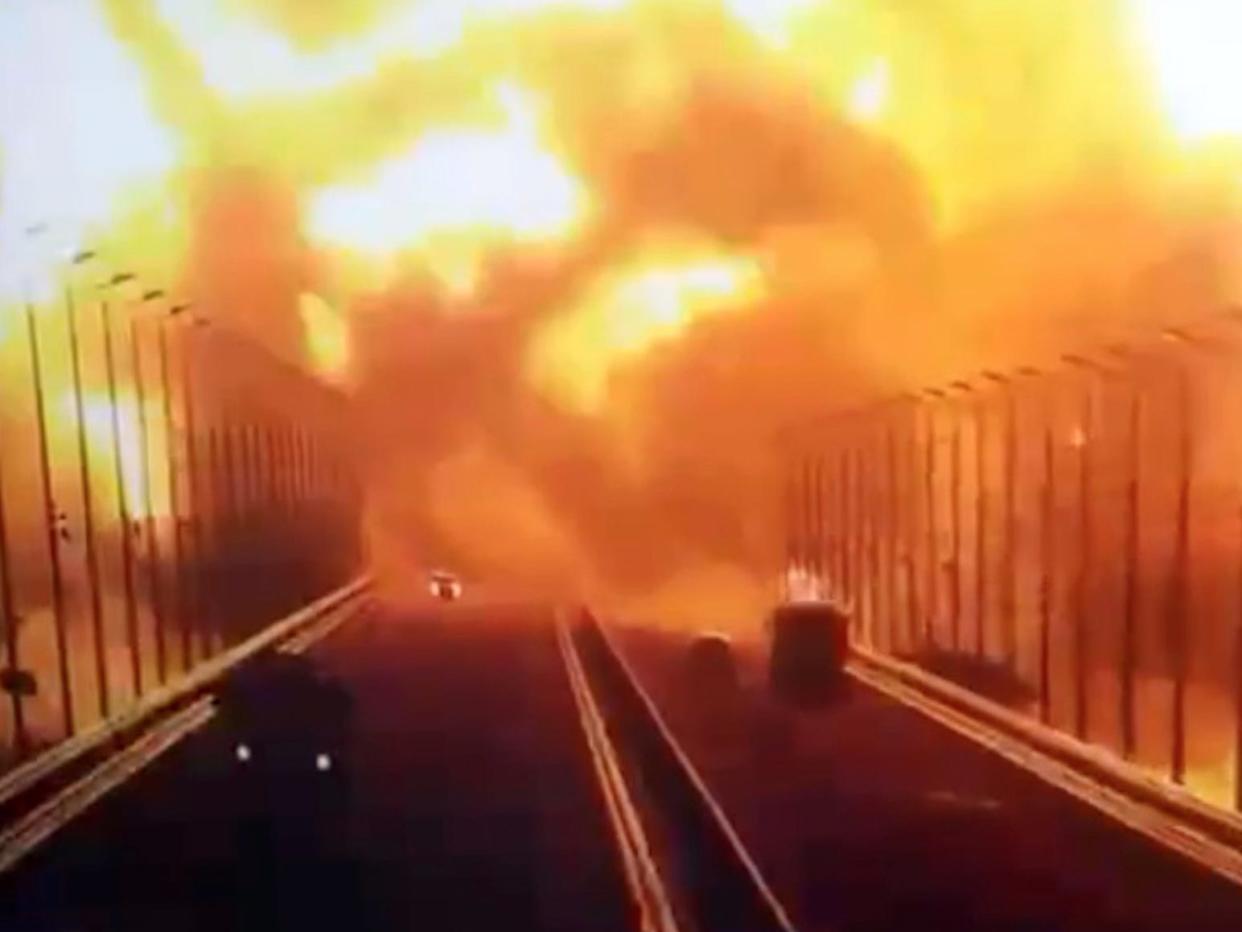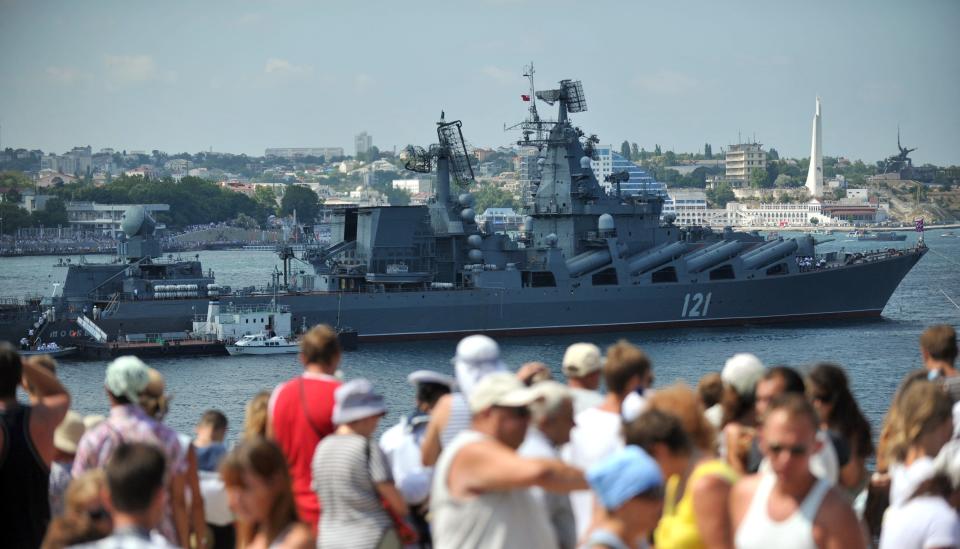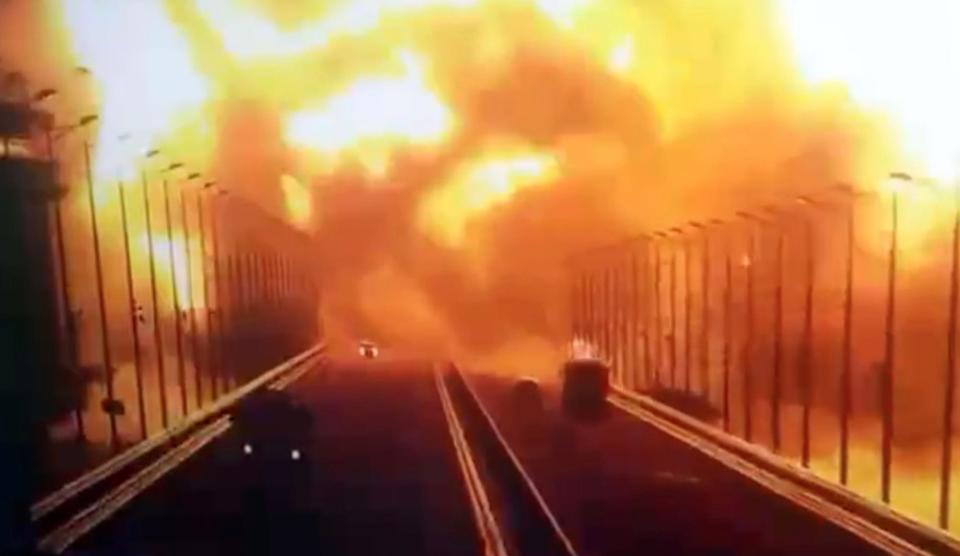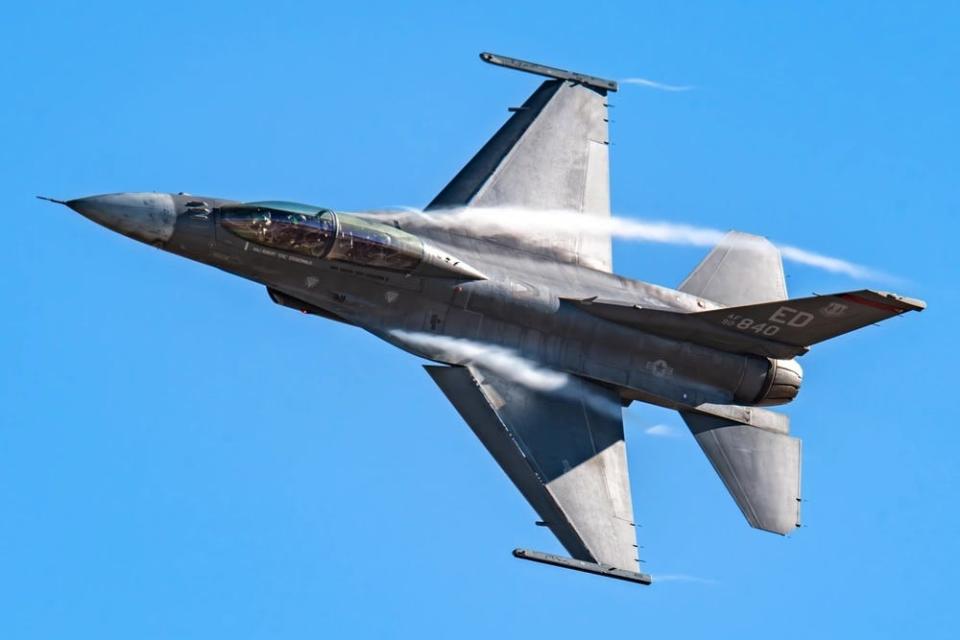Russia's war in Ukraine began in Crimea. It could end there, too, defense experts say.

Ukraine has intensified attacks on Crimea in recent months and looks set to hit the Kerch Bridge.
The peninsula and the bridge are crucial for Russian military logistics.
Ukrainian success in Crimea could mark the end of the war, defense experts say.
If there's one place Ukraine is winning in the war against Russia, it's Crimea, defense experts say.
At the start of the year, Ukrainian President Volodymyr Zelenskyy made it clear the battle for Crimea and the Black Sea would play a central role in the coming months.
Ukrainian success in Crimea would be a major blow for Russian President Vladimir Putin.
"Russia's defeat in Crimea would be not just a defeat, but a humiliation," Olga Khvostunova, a fellow in the Eurasia Program at the Foreign Policy Research Institute, said.
In February 2014, unmarked Russian forces, dubbed "little green men," stormed Crimea, taking control of key buildings and raising Russian flags above them.
By the end of March of that year, Russia's Federal Assembly had formally ratified the peninsula's annexation. The war in the Donbas began just a month later.
Ukrainians have since referred to the Black Sea peninsula as "occupied Crimea," and Zelenskyy has continually said that any peace agreement must see it returned to Ukraine.
In the past few weeks, Ukraine has launched a series of successful attacks on the region, taking out multiple Russian air-defense batteries and striking Belbek airfield near Sevastopol.
Ukrainian attacks on the peninsula "are proving successful due to thorough preparation and systemic work, better opportunities for defense forces, satellite and aerial intelligence provided to Ukraine by NATO allies," Elina Beketova, a democracy fellow at the Center for European Policy Analysis, told Business Insider.
Meanwhile, Ukraine, which lost its traditional naval fleet during the annexation of Crimea, has targeted Russia's Black Sea fleet with great success using sea drones.
The attacks have allowed Ukraine to resume grain shipments through the Black Sea, which is vital for its economy, and forced Russia's Black Sea Fleet to move some operations away from its naval home base in Sevastopol on the Crimean peninsula.
Ukraine even said it sunk the Black Sea Fleet's flagship, the Moskva.

Crimea "is the key to Russia's Black Sea access and operations," Maria Snegovaya, a senior fellow with the Center for Strategic and International Studies' Europe, Russia, and Eurasia Program, said.
"Crimea allows for power projection over the rest of the Black Sea. Accordingly, deterring Russian naval positions in Crimea is critical for Ukraine," she continued.
Beketova added that attacks on the peninsula and on the Black Sea Fleet were therefore aimed at depriving "Russian forces of the opportunity to use the peninsula for attacks on mainland Ukraine," as well as disrupting the support for Russian troops in the occupied territories in the south of Ukraine.
One of the most hated symbols of Russia's illegal annexation
The 12-mile-long Kerch Bridge links mainland Russia to the eastern coast of Crimea.
For Putin, the bridge is one of his greatest achievements, symbolizing what he believes is the "return" of Crimea to Russia.
Its destruction would, therefore, be both a strategic and symbolic victory for Ukraine and a major blow to Putin.
Ukraine has already struck the bridge twice since the start of Russia's full-scale invasion, but it has thus far failed to destroy it.

Earlier this year, officials from Ukraine's Main Directorate of Intelligence told The Guardian that Ukraine would target the bridge for a third time before the year was up.
They said its destruction was "inevitable."
And there are already signs that Russia fears Ukraine may make another attack on the bridge.
Last week, the UK Ministry of Defence said in an update on the conflict that Russia had installed eight barges on the southern side of the bridge to reduce "the angles of approach for Ukrainian Unmanned Service Vehicles."
Russia has also begun taking measures to reduce its dependence on the Kerch Bridge.
The MoD said in an update in March that Putin had announced the construction of a railway line from Rostov-on-Don in the south of Russia to Crimea.
Putin said the line would stretch as far as Sevastopol and "provide redundancy" for the Kerch Bridge, the department wrote.
Some in Ukraine have taken this as a sign of Putin's recognition of Ukraine's threat to the bridge.
"The railway along the land corridor is recognition on the part of the Russian occupiers that the Crimean Bridge is doomed," Dmitry Pletenchuk, a spokesman for Ukraine's southern military command, told The Economist.
Crimea has a special place in Russian hearts

Russian Empress Catherine the Great annexed Crimea in 1783, and the territory has been militarily and symbolically important to Russia ever since.
It holds a special place in the nation's collective memory of the Soviet era, when it became a popular vacation destination for generations of workers because of its warm climate, Snegovaya said.
In 2022, massive explosions at the Saki air base, which Ukraine claimed to be behind, brought the war to vacationing Russians, who filmed the attack from beach huts.
Alexei Volkov, the president of the National Union of Hospitality Industries, told Reuters last year that tourist numbers in Crimea were expected to be down 20% to 30%, to between 6 million and 6.5 million people.

Frederik Mertens, a strategic analyst at the Hague Centre for Strategic Studies, told BI that by targeting the peninsula, especially Russian ground-based air-defense (GBAD) systems, Ukraine was "preparing the ground" for future air strikes once F-16 fighter jets arrived.
"Crimea is vulnerable," he said. "The Russians have relatively limited maneuver space on the peninsula."
"Putin has a lot to lose both politically and militarily. So if a limited number of fighters can have a real impact, it is here — and above the Black Sea that becomes fully accessible once the GBAD on Crimea is dealt with," he added.
Russia has relocated its most advanced S-500 air-defense system to the peninsula, probably to protect the region from jets, Ukraine's spy chief, Kyrylo Budanov, has previously said.
"Russia cannot afford to lose Crimea," Snegovaya said. "This offers Ukraine an opportunity to use threatening the status of Crimea as a bargaining chip in future negotiations."
Beketova said that if Ukraine could regain control of the Black Sea and take back the peninsula — or simply put enough pressure on these areas to threaten Putin — "it will mark the end of the war."
Read the original article on Business Insider

